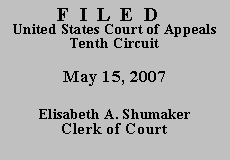

| UNITED STATES OF AMERICA,
Plaintiff-Appellee, v. BRIAN GERHARTZ, Defendant-Appellant. |
|
The government has moved to enforce the plea agreement. Mr. Gerhartz's counsel responded to the motion, stating, in total, that there is "no colorable argument to offer in resistance to the government's motion." Resp. to Mot. to Enforce Plea Agreement at 1. This court gave Mr. Gerhartz an opportunity to file a pro se response to the motion to enforce. To date, he has not done so.
Nevertheless, we have reviewed the plea agreement, the change of plea hearing transcript, the sentencing hearing transcript, and the motion to enforce. We conclude that the following three factors have been satisfied: (1) "the disputed appeal falls within the scope of the waiver of appellate rights"; (2) Mr. Gerhartz "knowingly and voluntarily waived his appellate rights"; and (3) "enforcing the waiver would [not] result in a miscarriage of justice." United States v. Hahn, 359 F.3d 1315, 1325 (10th Cir. 2004) (per curiam) (en banc). Accordingly, Mr. Gerhartz's waiver of his right to appeal is enforceable.
We therefore GRANT the government's motion to enforce the appeal waiver and DISMISS the appeal. The mandate shall issue forthwith.
ENTERED FOR THE COURT
PER CURIAM
*. This panel has determined unanimously that oral argument would not materially assist the determination of this appeal. See Fed. R. App. P. 34(a)(2); 10th Cir. R. 34.1(G). The case is therefore ordered submitted without oral argument. This order and judgment is not binding precedent, except under the doctrines of law of the case, res judicata, and collateral estoppel. It may be cited, however, for its persuasive value consistent with Fed. R. App. P. 32.1 and 10th Cir. R. 32.1.